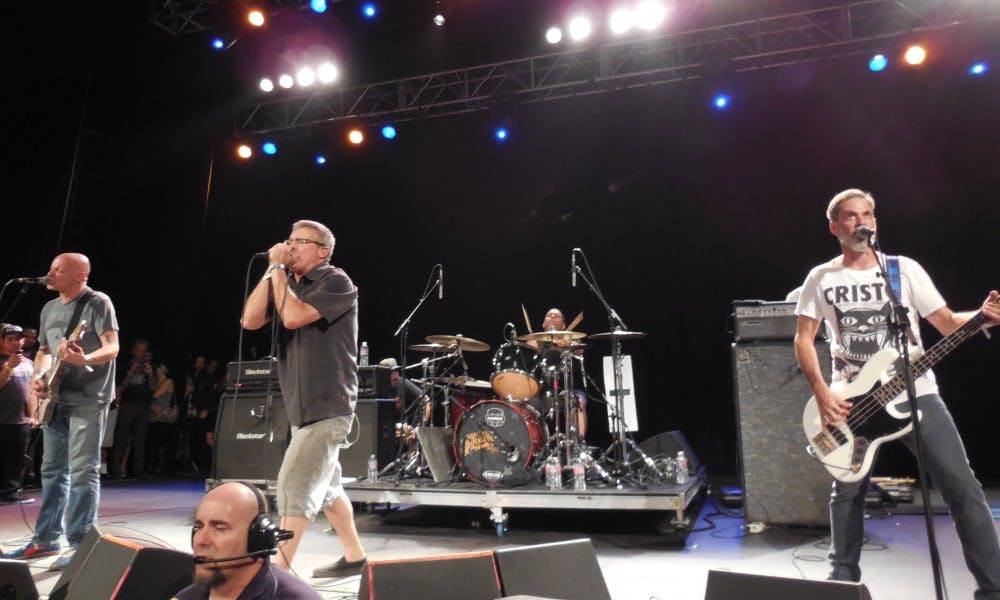Bad Religion surprised everyone in the punk scene this year when they dropped "Chaos From Within" at the end of February, a track meant to serve as the lead single to upcoming album Age of Unreason, their first LP since 2013's True North. When Age is released on May 3, it will be the band's 17th album in 39 years. A week after the release of the album's second single, "Do the Paranoid Style," Canadian punk band PUP released their newest showing, Morbid Stuff. With members of punk's old guard coming out of the woodwork as fresh faces put out music of their own, the question arises: Do we still need bands like Bad Religion?
Bad Religion co–songwriter and guitarist Brett Gurewitz explained in a statement, "The band has always stood for enlightenment values. Today, these values of truth, freedom, equality, tolerance, and science are in real danger. This record is our response." Lead vocalist Greg Graffin was inspired by both recent media headlines and historical research on the French and American revolutions and the Civil War. "I started to recognize that this is a pattern of history and something we should never venture into," he said in the same statement. "There are ample warnings against it. Every school child should know this but it’s hard to get people to read about these things. Maybe this album can help."
They aren't the only ones spurred to the studio by current events. In a recent interview with the Orange County Register, both Dexter Holland of The Offspring and Milo Aukerman of Descendents revealed that they were working on new music. Holland predicted a new record from The Offspring by the end of this year after proclaiming it "98% finished" in a March interview with Kerrang! while Aukerman said his band has "done some basic tracking, but it’s still a work in progress but I hope we’ll have something out by the end of the year.” Put together, the three bands have 116 years of making music, 32 studio albums, and three Ph.D.s.
That last statistic may be why these titans of punk recently faded into the shadows. Holland took a step back from The Offspring to receive his Ph.D. in molecular biology from USC in 2017. Aukerman, meanwhile, took a hiatus from music to work as a biologist and adjunct professor, and only returned to the scene full–time after being laid off from his job as a researcher at DuPont, hence the decade–long gap between 2004's Cool To Be You and 2016's Hypercaffium Spazzinate.
While Aukerman, Holland, and Graffin were taking a break from the studio, a new era of punk bands rose in their wake. Perhaps chief among them are FIDLAR and PUP, who released Almost Free and Morbid Stuff this year.
Rather than Bad Religion attempting to educate and enlighten their listeners, PUP vocalist Stefan Babcock told Rolling Stone that the band is "a process of self–discovery," and that, "writing songs has just been a way for [him] to kind of explore what was going on in [his] own brain.” Meanwhile, FIDLAR vocalist Zac Carper telling FLOOD that they started experimenting with sound "cause we got fuckin’ bored" is the antithesis of Holland telling Kerrang! that the upcoming Offspring release "sounds like our old shit."
New punk bands bear a few differences from their forebears besides all–caps band names. Their lyrics do address politics, such as FIDLAR's "Too Real" ("But of course the government is gonna fuckin' lie!"), but not to the same degree as the new Green Day chant, "No Trump! No KKK! No Fascist USA!" Rather, these artists tend to get personal, singing about subjects like depression, addiction, and failed relationships with the same fervor as Black Flag used to spit and shout about rising above.
Acoustically, they tend to blend genres rather than stick to the hardcore script: Almost Free makes use of brass instruments, while Morbid Stuff sounds like The Front Bottoms on "Kids" and early Black Flag on "Full Blown Meltdown." This genre–bending allows other artists to claim a share of the punk mantle: Hip–hop artist grandson has the wailing, distorted instrumentation for it, while The Homeless Gospel Choir sets his anti–government rants to an acoustic guitar.
These lyrical and acoustic differences will allow the old and new of punk to coexist, as they attract different crowds. Upcoming Bad Religion shows will no doubt see a motley crew of gray–haired fans who have been in mosh pits for forty years, as well as the baby punks they seek to educate with Age of Unreason.
PUP and FIDLAR, meanwhile, belong to the late–stage millennials and old Gen Z kids whose righteous anger has been tempered but not abated: They still want to get angry about their lives and the world around them, but the pit is an escape more than a call to action. In the end, it may be the bands in the middle who suffer the most: Green Day, Anti–Flag, and Rise Against were the first on the scene for the punk revival, with Revolution Radio, American Fall, and Wolves, but those releases were criticized for being too polished and toothless, going through the motions of punk. Their fans grew up and out of the scene, turning to Babcock and Carper or away from punk altogether. Billie Joe Armstrong, Justin Sane, and Tim McIlrath will have to adapt, die, or come back in ten years with Ph.D.s.







